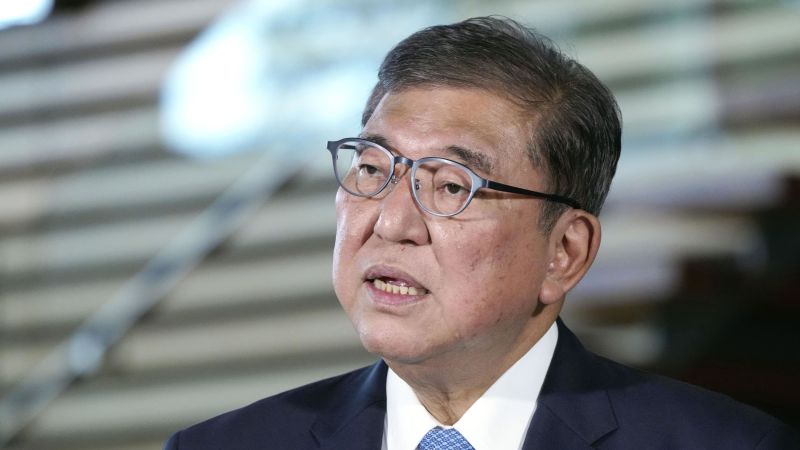Sanae Takaichi Becomes Japan's First Female Prime Minister Amid Conservative Shift
Introduction
Sanae Takaichi's ascension to Japan's prime ministerial role marks a historic moment as the country's first female leader. Her ultraconservative stance and leadership of the Liberal Democratic Party (LDP) have positioned her for this significant political milestone.
Key Details
Takaichi's journey was supported by securing a crucial coalition partner, which was necessary after the Komeito party withdrew from their long-standing alliance. This shift reflects broader changes within the LDP, as it seeks to navigate ongoing political challenges and scandals affecting public support.
Impact
Takaichi's election underscores a shift towards conservative policies within Japan's government. Her leadership will be closely watched, particularly as she addresses key issues such as economic security and international relations. Her tenure begins with significant challenges, including a visit from US President Donald Trump, which will be an early test of her diplomatic skills.
About the People Mentioned
Sanae Takaichi
Sanae Takaichi is a Japanese politician of the Liberal Democratic Party (LDP) who became Japan’s first female prime minister after winning the LDP leadership and being elected by the National Diet in 2025[2][3]. She was first elected to the House of Representatives in 1993 and has held multiple cabinet posts, notably Minister for Internal Affairs and Communications and Minister of State for Economic Security[5][3]. Takaichi is widely described as a conservative and a protégé of former prime minister Shinzō Abe, advocating traditionalist cultural policies, stronger defence and economic-security measures, and limits on immigration[5][3]. Her tenure as a senior minister included controversial moves such as seeking greater government influence over public broadcasting and visiting the Yasukuni Shrine while in office[5]. After several attempts at party leadership, she secured the LDP presidency in 2025 and led a minority government formed with the Japan Innovation Party amid a fractured Diet and the end of the long-standing LDP–Kōmeitō alliance[2][3]. Key challenges cited for her government include restoring public trust after LDP funding scandals, addressing Japan’s demographic decline and low growth, high public debt, inflation and wage issues, and navigating a tense regional security environment involving China and North Korea[2][3]. Analysts note her policy priorities include expansionary fiscal measures, tighter control over monetary policy levers, and strengthening the U.S.–Japan alliance and economic-security ties[2][5]. Takaichi’s rise is significant both for breaking gender barriers in Japanese national leadership and for shifting the LDP toward more conservative, security-focused policies during a period of domestic political realignment[3][5].
Donald Trump
Donald John Trump, born June 14, 1946, in Queens, New York, is an American businessman, media personality, and politician. He graduated from the University of Pennsylvania’s Wharton School in 1968 with a degree in economics. In 1971, he took over his family’s real estate business, renaming it the Trump Organization, through which he expanded into building and managing skyscrapers, hotels, casinos, and golf courses. Trump gained widespread fame as the host of the reality TV show *The Apprentice* from 2004 to 2015, which helped establish his public persona as a successful entrepreneur. Trump entered politics as a Republican and was elected the 45th president of the United States, serving from 2017 to 2021. His presidency was marked by significant policy actions including tax cuts, deregulation, the appointment of three Supreme Court justices, renegotiation of trade agreements (notably replacing NAFTA with the USMCA), and a focus on immigration control including border wall expansion. He withdrew the U.S. from international agreements such as the Paris Climate Accord and the Iran nuclear deal, and engaged in a trade war with China. His administration’s response to the COVID-19 pandemic was criticized for downplaying the virus’s severity. Trump was impeached twice by the House of Representatives—first in 2019 for abuse of power and obstruction, and again in 2021 for incitement of insurrection—but was acquitted by the Senate both times. After losing the 2020 election to Joe Biden, Trump challenged the results, culminating in the January 6, 2021, Capitol riot. He remains a central figure in American politics, having won the 2024 presidential election and returned as the 47th president in 2025, continuing to promote policies aimed at economic growth, border security, and military strength[1][2][3][4].
About the Organizations Mentioned
Liberal Democratic Party (LDP)
The **Liberal Democratic Party (LDP)** of Japan is a dominant conservative political party, established in 1955 through the merger of the Japan Democratic Party and the Liberal Party. Since then, it has governed Japan almost continuously, shaping the country’s post-war political landscape[2][7]. The LDP traditionally supports economic conservatism, advocating for low taxes to stimulate business growth while also endorsing a strong welfare state, disaster prevention, and social security reforms[2]. The party’s foreign policy aligns closely with Western powers, particularly the United States, maintaining a firm stance against Russian territorial expansion near Hokkaido and North Korea's nuclear ambitions. A significant policy focus has been revising Japan’s post-WWII pacifist constitution to allow a more proactive military role, aiming for a formal self-defense capability and meeting a defense spending target of 2% of GDP[2][3]. In recent developments, the LDP entered a historic coalition agreement with the reformist Nippon Ishin no Kai party in October 2025, forming a joint government to address Japan’s intensifying domestic and international challenges. This coalition emphasizes constitutional revision, defense buildup, fiscal and social security reform, and governance restructuring to strengthen Japan’s global standing[1]. Leadership within the LDP saw a major transition in 2025. Following the resignation of President Ishiba Shigeru, Sanae Takaichi won the party’s presidential election on October 4, becoming Japan’s first female prime minister. Her platform includes economic reform, tax abolition, wage increases, and defense commitments, signaling a push toward modernization and internal party reform[3][6][8]. Overall, the LDP remains central to Japan’s political and economic direction, balancing traditional conservatism with emergent reformist efforts to respond to evolving geopolitical realities and domestic pressures. Its recent coalition and leadership changes underscore a strategic pivot aimed at national revival and resilience in a complex global environment[1][3].
Komeito
## Overview of Komeito Komeito, also known as the Clean Government Party, is a Japanese political party founded in 1964 as the political wing of the Buddhist lay movement Soka Gakkai. The party's origins trace back to the Political Federation for Clean Government launched in 1961, reflecting a commitment to humanistic and pacifist principles[1][3]. Komeito's founding aimed to provide a political voice for the underrepresented, focusing on issues like peace, social security, and human rights[3]. ## History and Evolution Initially, Komeito made significant electoral gains, becoming a key player in Japanese politics. However, it dissolved in 1994 to form part of a coalition government. The party re-emerged as New Komeito in 1998, maintaining its core principles while adapting to changing political landscapes[3][8]. Over the years, Komeito has evolved from a more progressive stance to a center-to-center-right conservative position, often playing a crucial role as a coalition partner with the Liberal Democratic Party (LDP)[7]. ## Key Achievements and Current Status Komeito has been instrumental in promoting decentralization and empowering local governments in Japan[4]. It has also been a key player in maintaining regional stability, particularly in Japan-China relations, by advocating for dialogue and cooperation[6]. Recently, Komeito withdrew from its formal coalition with the LDP due to ideological differences and political funding scandals, marking a significant shift in Japanese politics[5]. ## Notable Aspects - **Political Influence**: Komeito's influence is closely tied to its relationship with Soka Gakkai, which supports its pacifist and anti-corruption stance[5]. - **Grassroots Approach**: The party emphasizes grassroots democracy and community-level governance[4]. - **Diplomatic Role**: Komeito plays a crucial role in fostering Japan-China relations, focusing on shared challenges like climate change and global

















